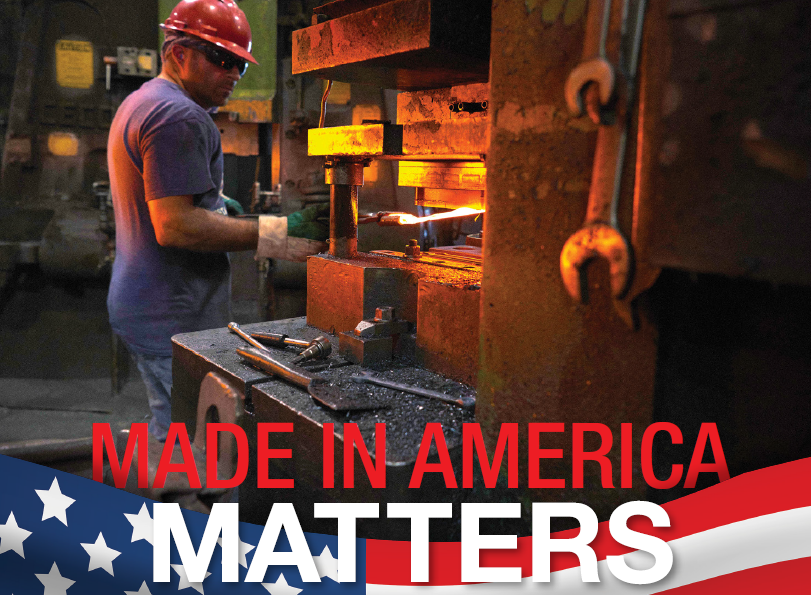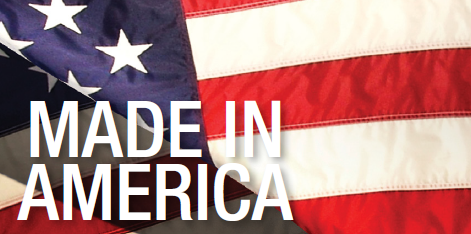 |
| Wright Tool Co.; istockphoto.com |
Growing in popularity, sourcing products made in the USA has obvious supply chain advantages.
by Kim Phelan
According to Harry Moser, founder of the Reshoring Initiative, U.S. imports of Chinese goods plunged by 13% last year to $500.3 billion, the biggest drop in 30 years. China saw its global exports slump by 4.6% to $3.4 trillion in 2023, the first full-year decline in seven years. China’s manufacturing activity contracted for a fifth consecutive month in February 2024. And in an unprecedented change in trade flows, China exported more to Southeast Asia than to the United States in 2023, exemplifying a slow decoupling between the two behemoths.
“China’s economic growth is expected to slip to 4.6% in 2024 from its 2023 three-decade-low of 5.2%, and then plummet to 3.4% by 2028 according to the International Monetary Fund (IMF),” says Moser. “Annual growth is expected to continue slowing to ~2% by 2030 according to consulting firm, Capital Economics. In sharp contrast, the U.S. economy is humming along exceeding expectations, with GDP growth of 4.9% and 3.3% in the third and fourth quarters of 2023, respectively.
“Geopolitical risk and U.S. industrial policy are driving manufacturing to the United States. The cumulative number of jobs brought back since the manufacturing low in 2010 is now approximately two million.
 |
| Moser |
“U.S. manufacturing is coming home.”
According to an article in “Material Handling & Logistics,” a survey earlier this year examined a number of global logistics and supply chain issues.
“One of the more striking findings was that 63% of survey respondents say their companies will continue overhauling supply chains by spreading production to multiple locations or relocating it to home markets and nearby countries,” the article stated.
Highlights from the survey included:
- China – 40% expect their businesses to be less reliant on China in five years. Leading factors in decisions to de-risk in China: difficulty of doing business; U.S.-China trade friction; a slowing economy; the harshness of China’s COVID-19 restrictions.
- Supply chain restructuring – India, Europe and North America rank ahead of China as destinations executives expect to move production to in 2024 and onwards.
- Emerging markets – the largest percentage sees increased risk/decreased rewards in emerging markets.
 |
| istockphoto.com |
WHAT IS MADE IN USA?
A blog by Joe Vanzile at Wholesale Central states, “according to the Federal Trade Commission, a product can be labeled as ‘Made in America’ if at least 75% of the finished product is ‘U.S. content,’ including parts and labor, based on the cost of the goods sold.
“The product must also be final assembled in America. It seems straightforward, but this can lead to some confusing situations. For example, many of Toyota’s cars, which are manufactured and assembled in the United States, are more “American” than Ford’s cars, even though Toyota is a foreign-owned corporation.
“There are currently no numbers on the size of the Made in America market, but there are still plenty of obvious benefits . . . to feature American products. The most obvious, of course, is supporting the American middle and manufacturing class, especially younger people, who suffered the worst during the so-called great recession of 2008-2009. ‘It used to be that Americans 60 and over preferred American-made products,’ said Joel D. Joseph, chairman of the Made in the USA Foundation. ‘But now we’re finding that males age 18–30 are the strongest supporters of buying American. We think it’s because they came to the realization that if people don’t buy American, they won’t have a job.’”
The article continued: “Global manufacturing companies operating overseas are coming under increasing scrutiny for their vendors’ working conditions. Companies including Nike, Walmart, Sears, Disney and Apple have all been criticized for hiring overseas vendors that operate unsafe factories, or treat their employees unfairly . . . Partially as a result of this scandal, Johnson says that Apple just announced the construction of new U.S.-based manufacturing plants. Another giant, Walmart, recently announced that it plans to buy $250 billion of American products in the next year.”
INDUSTRIAL TOOLMAKER EXEMPLIFIES MADE IN AMERICA
Tom Futey, president and co-owner of Wright Tool Co., says the benefits are many to distributors that carry Made in America products.
 |
| Futey |
“Made in the USA indicates a level of higher quality because American-made tools must conform to higher standards,” he says. “The government sets standards of what defines the quality of a tool to increase the quality level of the tool industry. At Wright Tool, we not only meet these standards but exceed them, ensuring our tools surpass expectations. Located under one roof in Barberton, Ohio, our manufacturing process guarantees consistency and uncompromising quality across all our products.
“By manufacturing our tools domestically, we gain a significant advantage in terms of speed and efficiency. This proximity allows us to promptly deliver our products to customers and help distributors be more profitable. This is critical for supply chains and helping professionals build and rebuild America.
“Manufacturing in the USA holds greater significance today than ever before. The dwindling presence of American-based companies has led to a concerning loss of skilled workers and invaluable generational knowledge,” he continued. “For centuries, knowledge of craftsmanship and manufacturing techniques has been handed down from one generation to the next, enriching the collective expertise of American industries. However, as companies shut their doors or relocate operations overseas, this instrumental knowledge is at risk of being lost forever.”
For nearly a century, Wright Tool has manufactured tools in America. Throughout its 97-year history, Wright Tool has been dedicated to serving industrial distribution markets with a focus on product quality and consistency. As a privately held company, it focuses on one brand of quality. By centralizing its operations and leveraging its 17 manufacturing departments under one factory roof, Futey says they can ensure every tool they produce meets their high standards and is delivered promptly to customers.
Futey says Wright Tool thrives on innovation, constantly striving to create tools that are stronger and more impactful.
“Our commitment to innovation is evident in our three patented products: Wright Grip 2.0, Wright Drive 2.0, and Wright Square, which are set to impact our entire product line,” he said. “With a focus on professional safety, our tools are carefully crafted to ensure reliability and peace of mind for those who help build America. Professionals can trust in the quality of our tools, knowing they are not only effective but also designed to minimize liability risks and ensure safety on the job.”
He notes that bringing production back to America is not without significant challenges for companies manufacturing outside the U.S.
“It’s not a quick fix,” he said. “Rather, it requires a concerted effort involving a diverse group of individuals. The loss of generational knowledge, talent and the made in the USA culture makes this task even more daunting.
“While it’s possible to acquire the necessary equipment for manufacturing, true expertise and craftsmanship are irreplaceable. Without skilled workers, consistently achieving high-quality tools becomes increasingly difficult. This has led some companies to turn to automation and robotics. However, the human touch remains essential in ensuring precision and excellence in manufacturing processes.”
US ROOTS AND PRESENCE
 |
| Jeevanantham |
Norton, an abrasives technology brand of Saint-Gobain, says it has strong roots in American manufacturing and is dedicated to continuing its legacy of innovation. In 1885, Norton Co. was founded by seven entrepreneurs who bought a patent from Frank Norton for a grinding wheel. At about that same time, they purchased land in Worcester, Massachusetts, and built the first grinding wheel plant. The company remains at the same location where the original plant was built. In 1990, Saint-Gobain purchased Norton, and in 2001 Norton officially changed its name to Saint-Gobain Abrasives, but the company retained the Norton brand because of its rich history. Today, Norton Saint-Gobain manufactures from 12 plants in the U.S., as well as Europe, the Middle East, Africa, South America, Asia Pacific, and India.
“It is advantageous to have products and expertise available at a local level to help meet delivery timelines and to form close partnerships for applications consultation, respectively,” said Muthukumaran Jeevanantham, general manager, bonded abrasives and super abrasives. “We believe it is more important than ever to support U.S. manufacturing, especially for our employees across the country who take deep pride in their work. It is common at Norton to have second and third generation employees who not only pass down their expertise to one another, but also create an environment where teamwork thrives to make precise, high quality abrasives.”
 |
| Allen |
In 1880, The L.S. Starrett Co. founder, Laroy Sunderland Starrett, invented and made the world’s first combination square in Athol, Massachusetts. Since then, the company has made millions of precision tools, gages and metrology equipment in Athol. Today, over 90% of Starrett tools are still manufactured at its Athol, Massachusetts, headquarters.
“Although Starrett is global, we are committed to our heritage as a made-in-the-USA company,” said David Allen, vice president. “It’s in our DNA to manufacture in the USA, and we are continuing to help build a skilled workforce in America. The words of our founder put it well: ‘I have believed that I could do no greater good than help create a business that would give people employment and a chance to earn an honest living.’”
Allen says process improvements for manufacturing reliable, accurate products and minimizing potential supply chain issues are driving more industrial goods to be made in America.
 |
| Hellinger |
Although the majority of Emuge- Franken’s products are engineered and made in Germany, the company has opened a manufacturing and tool reconditioning facility in West Boylston, Massachusetts, to improve its response time to customer needs, says Bob Hellinger, president of Emuge-Franken USA. It was a long-term strategic decision to invest in the world’s largest manufacturing economy, he added.
“One of the reasons behind establishing a complete carbide tooling manufacturing facility in the U.S. was to reduce shipping times,” Hellinger said. “Even more importantly, our U.S. manufacturing facility helps us provide localized engineering and design support for the carbide tooling market.”
This article originally appeared in the July/August 2024 issue of Industrial Supply magazine. Copyright 2024, Direct Business Media.












